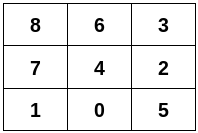LeetCode in Kotlin
3311. Construct 2D Grid Matching Graph Layout
Hard
You are given a 2D integer array edges representing an undirected graph having n nodes, where edges[i] = [ui, vi] denotes an edge between nodes ui and vi.
Construct a 2D grid that satisfies these conditions:
- The grid contains all nodes from
0ton - 1in its cells, with each node appearing exactly once. - Two nodes should be in adjacent grid cells (horizontally or vertically) if and only if there is an edge between them in
edges.
It is guaranteed that edges can form a 2D grid that satisfies the conditions.
Return a 2D integer array satisfying the conditions above. If there are multiple solutions, return any of them.
Example 1:
Input: n = 4, edges = [[0,1],[0,2],[1,3],[2,3]]
Output: [[3,1],[2,0]]
Explanation:

Example 2:
Input: n = 5, edges = [[0,1],[1,3],[2,3],[2,4]]
Output: [[4,2,3,1,0]]
Explanation:

Example 3:
Input: n = 9, edges = [[0,1],[0,4],[0,5],[1,7],[2,3],[2,4],[2,5],[3,6],[4,6],[4,7],[6,8],[7,8]]
Output: [[8,6,3],[7,4,2],[1,0,5]]
Explanation:

Constraints:
2 <= n <= 5 * 1041 <= edges.length <= 105edges[i] = [ui, vi]0 <= ui < vi < n- All the edges are distinct.
- The input is generated such that
edgescan form a 2D grid that satisfies the conditions.
Solution
import kotlin.math.min
class Solution {
fun constructGridLayout(n: Int, edges: Array<IntArray>): Array<IntArray> {
val cs = IntArray(n)
val als: Array<ArrayList<Int>> = Array<ArrayList<Int>>(n) { ArrayList<Int>() }
for (e in edges) {
cs[e[0]]++
cs[e[1]]++
als[e[0]].add(e[1])
als[e[1]].add(e[0])
}
var min = 4
for (a in cs) {
min = min(min, a)
}
val seen = BooleanArray(n)
var res: Array<IntArray>
var st = 0
for (i in 0 until n) {
if (cs[i] == min) {
st = i
break
}
}
if (min == 1) {
res = Array<IntArray>(1) { IntArray(n) }
for (i in 0 until n) {
res[0][i] = st
seen[st] = true
if (i + 1 < n) {
for (a in als[st]) {
if (!seen[a]) {
st = a
break
}
}
}
}
return res
}
var row2 = -1
for (a in als[st]) {
if (cs[a] == min) {
row2 = a
break
}
}
if (row2 >= 0) {
return getInts2(n, st, row2, seen, als)
}
return getInts1(n, seen, st, als, cs)
}
private fun getInts1(
n: Int,
seen: BooleanArray,
st: Int,
als: Array<ArrayList<Int>>,
cs: IntArray,
): Array<IntArray> {
var st = st
var res: Array<IntArray>
val al = ArrayList<Int>()
var f = true
seen[st] = true
al.add(st)
while (f) {
f = false
for (a in als[st]) {
if (!seen[a] && cs[a] <= 3) {
seen[a] = true
al.add(a)
if (cs[a] == 3) {
f = true
st = a
}
break
}
}
}
res = Array<IntArray>(n / al.size) { IntArray(al.size) }
for (i in res[0].indices) {
res[0][i] = al[i]
}
for (i in 1 until res.size) {
for (j in res[0].indices) {
for (a in als[res[i - 1][j]]) {
if (!seen[a]) {
res[i][j] = a
seen[a] = true
break
}
}
}
}
return res
}
private fun getInts2(
n: Int,
st: Int,
row2: Int,
seen: BooleanArray,
als: Array<ArrayList<Int>>,
): Array<IntArray> {
var res: Array<IntArray> = Array<IntArray>(2) { IntArray(n / 2) }
res[0][0] = st
res[1][0] = row2
seen[row2] = true
seen[st] = seen[row2]
for (i in 1 until res[0].size) {
for (a in als[res[0][i - 1]]) {
if (!seen[a]) {
res[0][i] = a
seen[a] = true
break
}
}
for (a in als[res[1][i - 1]]) {
if (!seen[a]) {
res[1][i] = a
seen[a] = true
break
}
}
}
return res
}
}

